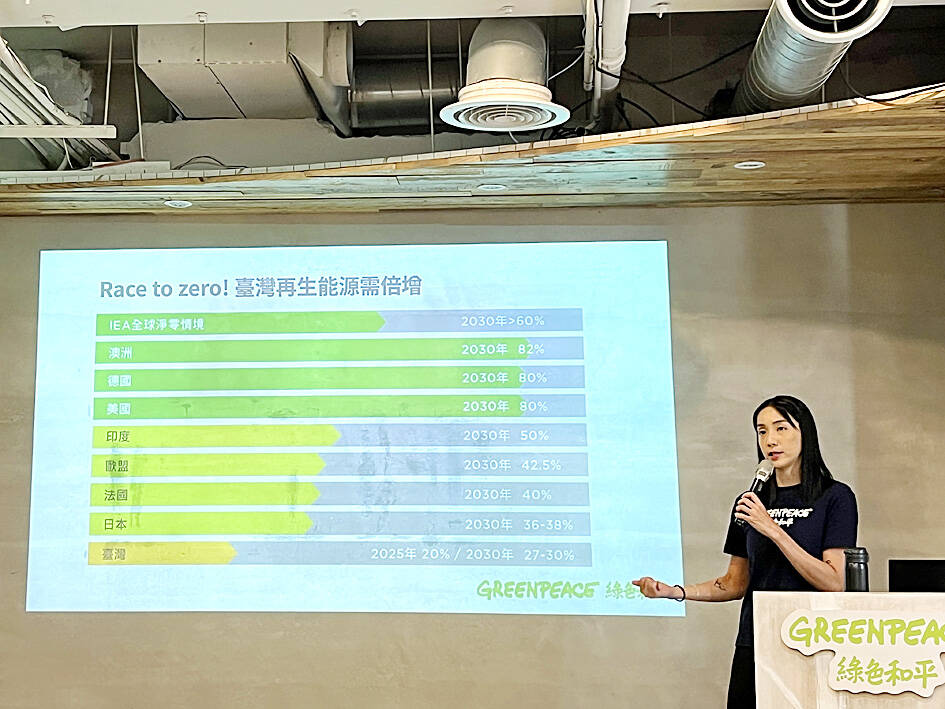Three of the nation’s presidential candidates are to take part in a televised climate policy debate next month, the event’s organizers, Greenpeace Taiwan and the International Climate Development Institute (ICDI), said on Thursday.
ICDI director Camyale Chao (趙恭岳) said the debate is to take place on Oct. 21, and that the nominees of Taiwan’s three largest political parties — Vice President William Lai (賴清德) of the Democratic Progressive Party, New Taipei City Mayor Hou You-yi (侯友宜) of the Chinese Nationalist Party (KMT) and former Taipei mayor Ko Wen-je (柯文哲) of the Taiwan People’s Party — have agreed to attend.
Greenpeace project manager Lena Chang (張皪心) said the candidates would take questions from representatives of the media, academia and the business world, as well as questions submitted online by members of the public.

Photo: Chen Chia-yi, Taipei Times
Due to time constraints, the candidates might not be able to respond to each other’s answers or engage in back-and-forth debate, she said.
Chang said the two other candidates in the presidential race — Hon Hai Precision Industry Co founder Terry Gou (郭台銘) and former Tainan County commissioner Su Huan-chih (蘇煥智) — might also be invited, depending on how their efforts to collect signatures and qualify for the ballot are going.
Although the candidates have laid out their energy policy proposals — mainly hinging on their support or opposition to nuclear energy — to date, none has published a formal climate or environmental platform.
On Thursday, Greenpeace called on the candidates to commit, and put forward plans to reduce greenhouse gas emissions by 40 percent and ensure renewable energy sources account for 40 percent of Taiwan’s energy mix by 2030.
Last year, 82.42 percent of the energy generated in Taiwan came from fossil fuels (mainly coal and liquefied natural gas), while 8.28 percent came from renewable energy sources, 8.24 percent from nuclear power and 1.06 percent from pumped storage hydropower, according to Bureau of Energy data.

Three Taiwanese airlines have prohibited passengers from packing Bluetooth earbuds and their charger cases in checked luggage. EVA Air and Uni Air said that Bluetooth earbuds and charger cases are categorized as portable electronic devices, which should be switched off if they are placed in checked luggage based on international aviation safety regulations. They must not be in standby or sleep mode. However, as charging would continue when earbuds are placed in the charger cases, which would contravene international aviation regulations, their cases must be carried as hand luggage, they said. Tigerair Taiwan said that earbud charger cases are equipped

Foreign travelers entering Taiwan on a short layover via Taiwan Taoyuan International Airport are receiving NT$600 gift vouchers from yesterday, the Tourism Administration said, adding that it hopes the incentive would boost tourism consumption at the airport. The program, which allows travelers holding non-Taiwan passports who enter the country during a layover of up to 24 hours to claim a voucher, aims to promote attractions at the airport, the agency said in a statement on Friday. To participate, travelers must sign up on the campaign Web site, the agency said. They can then present their passport and boarding pass for their connecting international

Temperatures in northern Taiwan are forecast to reach as high as 30°C today, as an ongoing northeasterly seasonal wind system weakens, the Central Weather Administration (CWA) said. CWA forecaster Tseng Chao-cheng (曾昭誠) said yesterday that with the seasonal wind system weakening, warmer easterly winds would boost the temperature today. Daytime temperatures in northern Taiwan and Yilan County are expected to range from 28°C to 30°C today, up about 3°C from yesterday, Tseng said. According to the CWA, temperature highs in central and southern Taiwan could stay stable. However, the weather is expected to turn cooler starting tonight as the northeasterly wind system strengthens again

Taiwan sweltered through its hottest October on record, the Central Weather Administration (CWA) said yesterday, the latest in a string of global temperature records. The main island endured its highest average temperature since 1950, CWA forecaster Liu Pei-teng said. Temperatures the world over have soared in recent years as human-induced climate change contributes to ever more erratic weather patterns. Taiwan’s average temperature was 27.381°C as of Thursday, Liu said. Liu said the average could slip 0.1°C by the end of yesterday, but it would still be higher than the previous record of 27.009°C in 2016. "The temperature only started lowering around Oct. 18 or 19